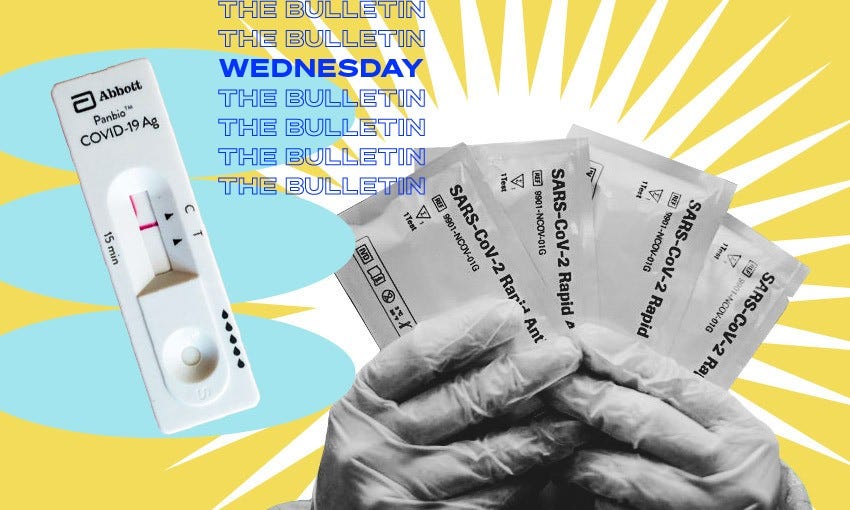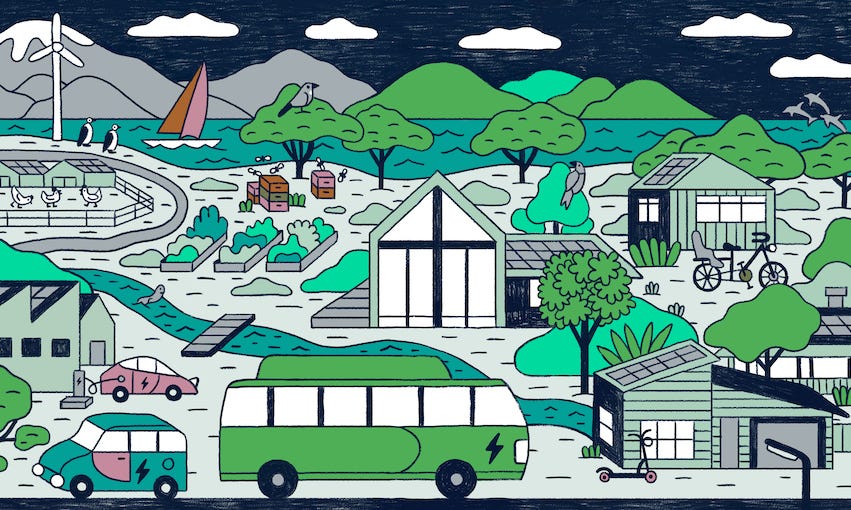It’s a RAT invasion
Facing a growing omicron surge, the government has ordered tens of millions more rapid antigen tests for delivery soon
Mōrena and welcome to The Bulletin for Wednesday, February 2, by Justin Giovannetti. Presented in partnership with Z Energy.
In today’s edition: PM to unveil new border plan; Bellis to return next month; government won’t increase retirement age; but first, a big order of rapid tests.
It’s likely these will become a regular part of our lives soon. (Image: Tina Tiller)
123 million rapid antigen tests (RATs). After weeks of skepticism from the Beehive about the value of rapid tests, the government now says it has ordered enough RATs to get the country through the worst of omicron, the NZ Herald reports. While the tests aren’t as accurate as nasal swabs, they’ll take a heavy burden off limited lab capacity. Following negotiations that went through the weekend, associate health minister Ayesha Verrall announced yesterday that 55 million tests have been secured for delivery over the next eight weeks. Only five million are in the country right now. By June, over 123 million will have arrived, with rapid tests becoming an increasingly regular part of daily life in New Zealand.
Rapid tests will become central to New Zealand’s outbreak strategy. If those orders seem large, Verrall revealed that nine million tests could be used weekly to help control the outbreak at its peak. That’s a conservative figure which assumes rapid tests will be prioritised for a “test to return” system, to get infected critical workers back to their jobs faster. In the later stages of the outbreak, the tests will likely be available for use at home to help people with symptoms find out if they’ve got Covid. The government is already planning on a move to the second stage of the omicron response, as case numbers increase this week.
Can you trust rapid tests? They can return false negatives, but that’s unlikely when someone is infected and has a high viral load, according to Dion O’Neale, the principal investigator with Te Pūnaha Matatini. That’s also when someone is at their most infectious. The rate of false positives is very low and not much of a worry in the middle of a major outbreak.
“Although RATs are not as sensitive as PCR tests, they have the big advantage that they can return a result in minutes rather than days. This is important because it means that it is possible to potentially confirm infections much sooner after exposure, and for people to respond accordingly by self-isolating in order to break any further chains of transmission,” said O’Neale.
There’s room to expand the level of testing further. Businesses have indicated they’d like more access to the tests, especially those in manufacturing where employees can’t work from home. National leader Christopher Luxon said he wants the government to consider expanding use to schools. Either move would require adding tens of millions more tests to the government’s order. According to Stuff, Verrall said no private orders have been impacted by the government’s large new shipments. The director-general of health said last week that orders made by businesses were being shipped to government warehouses instead. It’s unclear whether the minister meant only future orders, or whether those already requisitioned by government will now be forwarded to the businesses that purchased them.
Omicron means that, yet again, we at The Spinoff will be devoting significant resources to covering this enormous and complex story. If you value what we do, please consider becoming a member today. Every dollar donated is ring-fenced to support our journalism, and right now we need audience support more than ever.
Is your organisation keen to support The Spinoff? We would love to hear from you—contact us today to find out more about our organisation memberships.
Big changes are coming to the New Zealand border (again). The prime minister first unveiled the country’s border reopening plan in August. She spoke to a packed room and described how a Covid-free New Zealand would slowly open to the world. Then delta hit. In November, Jacinda Ardern tried again with a speedier plan. Then omicron hit. On Thursday, she’ll hope the third time does it. One News reports that Ardern will unveil when the country will move away from managed-isolation at the border to self-isolation at home. She’ll also detail how the government hopes to deal with the country’s severe labour shortages.
In a sign of what’s to come, Stuff reports that Air NZ has started cancelling flights because it no longer has enough flight crews to fill them. With a number of flights being considered locations of interest in recent days, the crews have had to self-isolate and await testing. The airline warns it’ll be a “a bumpy few weeks.”
The Spinoff’s Covid data tracker has the latest figures.
Charlotte Bellis will return to NZ in March after being given an MIQ slot. The pregnant journalist, currently in Afghanistan, was offered a voucher for managed-isolation and a flight yesterday after a growing showdown with the government. She accepted the offer, the NZ Herald reports, after the deputy prime minister publicly urged her to consider it. Bellis said she intends to maintain pressure on the government to change the system. In the end, officials wouldn’t recognise her pregnancy as a valid emergency, but instead told her she was only approved because of the risk of living in Afghanistan. Her case could remain a headache for the government after Bellis’ lawyer said privacy laws were violated when the Covid-19 minister revealed a number of her personal details in written statements his office sent to reporters.
Our partners at Lightforce love the sun. Life on Earth wouldn’t be possible without it. It’s essential for growing things, it makes us feel good when we’re basking in it and it is a crucial component of sunset photos on Instagram. As the world shifts away from fossil fuels, the sun is also proving to be an increasingly important and affordable source of renewable energy and the arrival of batteries that can store the sun’s energy have changed the game.
When you go solar, you’ll save heaps on power bills, decrease your carbon footprint, increase the value of your property and improve the cost effectiveness of your electric vehicle. To learn more check out the interactive tools on the Lightforce website to see how much you could save and this explainer on solar on The Spinoff. It’s time to let the sun in.
Government shoots down OECD recommendation to hike NZ retirement age. The trade group released a significant review of the New Zealand economy yesterday that made a number of suggestions to the government, including boosting intensive care beds and increasing the age of retirement. According to One News, the finance minister said Labour will stick with 65 for the retirement age, but a number of the OECD’s other recommendations are being considered. Among the Paris-based group’s ideas is a government ban on people withdrawing money from Kiwisaver for first-home deposits.
All Whites hit by Covid at overseas camp. The football squad was meant to play Uzbekistan in Dubai today, but the NZ Herald reports that the game has been cancelled after a number of cases were detected on the team. That match was going to be the team’s last before a qualifying tournament next month. It’s been a turbulent time for the All Whites, who lost to Jordan on Saturday and experienced a missile attack on Abu Dhabi. No one was injured as both missiles were intercepted.
A year after a military coup in Myanmar, New Zealand has slapped new travel bans on more generals. The foreign affairs minister called for a return to civil rule in the country as she announced sanctions on 16 of the main figures in Myanmar’s military junta, Stuff reports. There’s been an increase in armed violence across the country in the year since a democratic government was deposed, but the world has largely stopped paying attention. The Economist (soft paywall) has detailed how the junta has united Myanmar against itself.
Got some feedback about The Bulletin, or anything in the news?
Get in touch with me at thebulletin@thespinoff.co.nz
The leaders of the four biggest political parties in New Zealand. (Image: Tina Tiller)
Right now on The Spinoff: Toby Manhire writes what he expects our leaders will say in their state-of-the-nation speeches. Felix Walton cautions you not to look at your Kiwisaver right now. Dylan Cleaver argues that World Rugby has a beer problem and it needs to pick sides. Athena Rhodes explains why you should stop mowing your lawn. Rebecca K Reilly reviews Aljce in Therapy Land.
For a longer read, how Shein beat Amazon and created an era of ultra-fast fashion. Popular with Gen Z consumers, the Chinese retailer is now one of the world’s largest fashion companies. Many readers will have never heard of it, I hadn’t until a few months ago (it’s pronounced “she-in”). Over the past two years, it has become a juggernaut, adding thousands—yes, thousands—of new styles daily to its website by plucking trends off social media and turning them into mass-produced, incredibly cheap clothes, all within a few days. It overtook H&M and Zara, combined, in the US last year. Rest of World has looked into the rise of a company that has provided few details about its past, its founder or its plans for the future.
The first winter Olympic events start tomorrow, 1am curling anyone? Stuff has written a guide to five events you need to watch at the upcoming Olympics in Beijing—assuming you want to watch these games, which is frankly an open question. While there are 109 events in Beijing, some are better watching than others. It’s a solid list and I’d consider giving curling a try.







